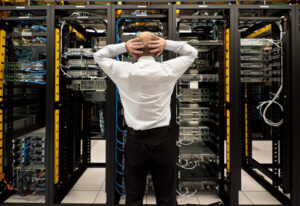The world is battling a crippling crisis today. The global economy is in peril and businesses have taken radical measures to mitigate the adverse impacts of economic decline. Companies have had to leverage the technology at their disposal to allow their employees to work remotely in order to attempt to achieve business continuity. Although technology has made remote work feasible, the unexpected magnitude of the situation has caught most small and midsize businesses off guard.
One of the challenges most companies face right now is ensuring business continuity with minimal loss of productivity of their remote workforce. While this unprecedented crisis has certainly transformed the way businesses around the world operate, it has also provided companies with an opportunity to reinforce their IT infrastructure to efficiently deal with the current situation and similar situations in the future.
As much as we would like to believe otherwise, no business is immune to disaster. Regardless of their size, companies need to be well prepared to ensure seamless continuity of critical operations in the face of unforeseen crises. The ultimate goal for businesses should be to minimize downtime. This includes the ability to maintain workforce productivity during an emergency, regardless of whether their employees are working remotely or in the office. It is imperative for businesses to have solid business continuity plans (BCPs) in place.
Not having a BCP as a part of your crisis management plan can be detrimental to your business. With a robust BCP in place, business leaders can respond swiftly and effectively to any contingency without negatively impacting customer confidence, profitability or brand reputation. Regardless of the size and nature of your business, a BCP can help prevent financial losses and maintain the stability of your business during tough times.
Backup and Disaster Recovery Plan
When hit by a crisis, the last thing you should be worrying about are your backup systems. Your backup systems should provide reliable, enterprise-class business continuity and disaster recovery. Focus on reducing downtime with instant recovery, ransomware detection, and automated disaster recovery testing. Our Ultimate Care package offers a solution that enables instant recovery of your backed-up data and minimizes downtime so that you can quickly get back on your feet after a crisis.
Managing Remote Worker IT Environments
What we learned from the current pandemic is that we must be prepared to institute remote work policies on short notice. A robust BCP should include an IT management solution that ensures smooth operations in case employees have to abruptly switch to remote work. The right remote management and monitoring solution will help you efficiently manage the remote devices of your users who are working from home. Your endpoint management solution should provide remote monitoring and remote control of remote and off-network endpoints.
We are able to access remote devices without interrupting and work behind the scenes. This keeps employee productivity high while allowing us to resolve issues quickly. Remote access is a powerful feature that also allows employees to access their work computers and continue to work productively if they need to abruptly transition to remote work. This means that even if your entire team suddenly needs to start working from home, your business operations can continue uninterrupted during an unexpected crisis. The result is improved business continuity.
Ensuring Security of Remote Workers
During any crisis, such as the current pandemic, cybercriminals work overtime to exploit vulnerabilities that can expose your business to potential cyber-attacks. With the lines between working from the office and working from home blurring, prioritizing the security assessment of your systems and networks should be your main focus. Implement Dark Web, which we offer in our Enhanced Cybersecurity package, monitoring to know when employee login credentials have been compromised.
In addition to this, it’s important to provide extensive security training to your workforce to ensure that they follow the best practices required to keep your systems protected against cyber-attacks. This will help in reducing the risks of ransomware and other cyber-attacks that can be extremely costly for small and midsize businesses.
The bottom line is that now, more than every before, your company’s software and data protection should be so robust as to be able to withstand any number of disasters, and that you are able to recover quickly for optimum business continuity.







